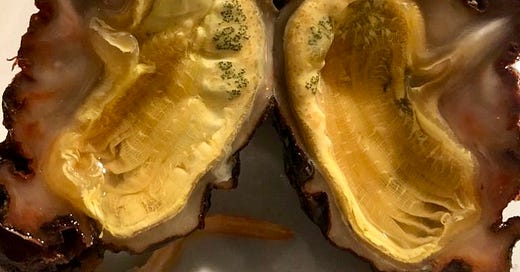no. 60: choices made by others
Leisure travel is an immersive state of consumption. Most of us don’t really have a way to think about “seeing a new place” that’s not about choosing what to consume next, whether it’s food and drink, experience, or objects to purchase. You can go somewhere to volunteer, worship, or practice aikido, but it’s not something that just happens. You have to make this intention the organizing principle of your trip, and at that point, is it really leisure travel anymore? To discover a place is, virtually by default, to consume it.
This has been especially apparent in France. Whichever city we’re in (with the possible exception of Paris), however large the ville, what goes on at street level in the urban core remains largely the same. There are the terrasses and the marchés. There are the streets of retailers, the same shops appearing over and over in Toulouse, Marseille, and Avignon. The setting around them changes, but this character feels inherited, set by choices made by others, long ago. The things that give each city character, the ironwork balconies, 12th century churches, and painted shutters, these feel like different skins over the same engines of efficient consumption.
If there’s anything to distinguish Marseille from New York, it might be the tempo, the pace at which the heart of commerce beats. This is undoubtedly slower here. People amble. It takes half an hour to sit, get an espresso, then eventually, if the server feels like it, the check. An apero is 2 hours on the terrasse, dinner another 3. Restaurants don’t turn tables.
There’s something about the architecture that makes this feel inevitable – the abundance of outdoor seating, the thickness of the walls that entomb you indoors. The streets seem expansive by contrast, because so much of them is given over to human beings rather than cars. They’re public space, not transit arteries, so much of the square footage of the city is effectively a giant place to linger.
Now, with coronatime having called forth new patios all over the US, cities in America feel even more like cities in France – the public space is dominated to an even greater degree by the activities of eating and shopping. I don’t know if the work culture will ever get there, but it feels like this is the logical endpoint as we run out of more “productive” things to do. Cities turn into tourist towns, because there’s nothing else left to do with the space. Office workers take less space than tanneries, and you can stack them higher. When you put a crowd of foot traffic in an area, and add in the pressure to turn a profit, there’s really nothing else you can do with the space.
But at the same time it’s hard to imagine that restaurants in New York will start letting you hang out for 3 hours on the patio with your coffee – the economics simply won’t work for them, now or ever. In Hong Kong, there’s long been a saying that you work to pay your landlord, and this seems a particularly transparent version of that. New York will never have a culture of 2 hour aperos, because neither the landlords nor the restaurants will ever accept such an unprofitable use of the space. Someone will always be leaning on you to make more money for them.
One of the joys of traveling is that you get to eat weird things, like this.
They’re apparently a sort of tunicate, and a local specialty of Marseille. My friend encouragingly introduced it as “having this weird, intensely mineral flavor, and a high concentration of heavy metals.” He was spot on.




